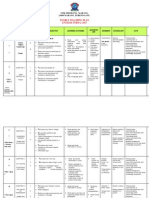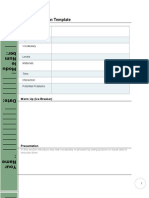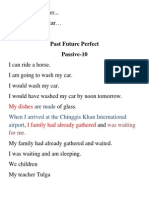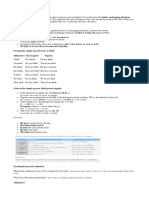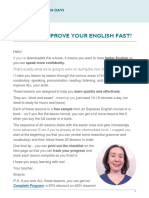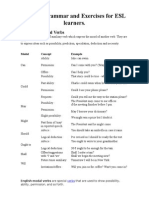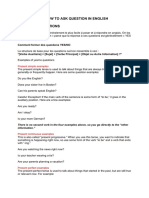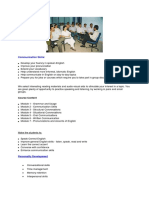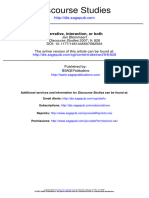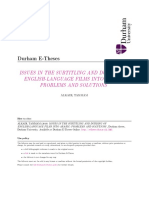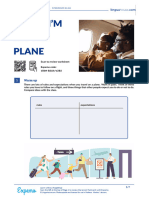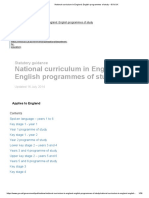English Notes
Uploaded by
Nurul Hawa AhmadEnglish Notes
Uploaded by
Nurul Hawa AhmadEnglish Grammar Rules: Simple Present Tense
We use the present tense: 1. For repeated or regular actions in the present time period.
Verb Conjugation & Spelling
We form the present tense using the base form of the infinitive (without the TO). In general, in the third person we add 'S' in the third person.
Subject I / you / we / they Verb The Rest of the sentence English at home English at home
I take the train to the office. The train to Berlin leaves every hour. John sleeps eight hours every night during the week.
2. For facts.
speak / learn speaks / he / she / it learns
The President of The USA lives in The White House. A dog has four legs. We come from Switzerland.
The spelling for the verb in the third person differs depending on the ending of that verb: 1. For verbs that end in -O, -CH, -SH, -SS, -X, or -Z we add -ES in the third person.
3. For habits.
I get up early every day. Carol brushes her teeth twice a day. They travel to their country house every weekend.
4. For things that are always / generally true.
go goes catch catches wash washes kiss kisses fix fixes buzz buzzes
It rains a lot in winter. The Queen of England lives in Buckingham Palace. They speak English at work.
2. For verbs that end in a consonant + Y, we remove the Y and add -IES.
marry marries study studies carry carries worry worries
NOTE: For verbs that end in a vowel + Y, we just add -S.
Examples of Negative Sentences with Don't and Doesn't:
play plays enjoy enjoys say says
Negative Sentences in the Simple Present Tense
Don't = Do not Doesn't = Does not I don't like meat = I do not like meat. There is no difference in meaning though we normally use contractions in spoken English.
You don't speak Arabic. John doesn't speak Italian. We don't have time for a rest. It doesn't move. They don't want to go to the party. She doesn't like fish.
Questions in the Simple Present Tense
The Rest of the sentence
Do/Does Subject Do I / you / we / they he / she / it
Verb*
Word Order of Negative Sentences
The following is the word order to construct a basic negative sentence in English in the Present Tense using Don't or Doesn't.
Does
have / need a new bike? want etc.
Examples of Questions with Do and Does:
Subjec t I / you / we / they he / she / it
The Rest don't/doesn't Verb* of the sentence
Do you need a dictionary? Does Mary need a dictionary? Do we have a meeting now? Does it rain a lot in winter? Do they want to go to the party? Does he like pizza?
don't doesn't
have / buy cereal for eat / breakfast like etc.
Short Answers with Do and Does
In questions that use do/does it is possible to give short answers to direct questions as follows:
Sample Questions Do you like chocolate? Do I need a pencil? Do you both like chocolate? Do they like chocolate? Does he like chocolate? Does she like chocolate? Does it have four wheels? Short Short Answer Answer (Affirmative) (Negative) Yes, I do. Yes, you do. Yes, we do. Yes, they do. No, I don't. No, you don't. No, we don't.
Irregular Verbs in English
Verb arise babysit be beat become bend begin bet bind bite bleed blow break breed bring broadcast build buy catch choose come cost cut deal dig do draw drink drive eat fall feed feel Past Simple Past Participle arose babysat was / were beat became bent began bet bound bit bled blew broke bred brought broadcast built bought caught chose came cost cut dealt dug did drew drank drove ate fell fed felt arisen babysat been beaten become bent begun bet bound bitten bled blown broken bred brought broadcast built bought caught chosen come cost cut dealt dug done drawn drunk driven eaten fallen fed felt
No, they don't. No, he Yes, he does. doesn't. Yes, she does. No, she doesn't. No, it doesn't.
Yes, it does.
However, if a question word such as who, when, where, why, which or how is used in the question, you can not use the short answers above to respond to the question.
fight find fly forbid forget forgive freeze get give go grow hang* have hear hide hit hold hurt keep know lay lead leave lend let lie ** light lose make mean meet pay put quit read *** ride
fought found flew forbade forgot forgave froze got gave went grew hung had heard hid hit held hurt kept knew laid led left lent let lay lit lost made meant met paid put quit read rode
fought found flown forbidden forgotten forgiven frozen gotten given gone grown hung had heard hidden hit held hurt kept known lain led left lent let lain lit lost made meant met paid put quit read ridden
ring rise run say see sell send set shake shine shoot show shut sing sink sit sleep slide speak spend spin spread stand steal stick sting strike swear sweep swim swing take teach tear tell think
rang rose ran said saw sold sent set shook shone shot showed shut sang sank sat slept slid spoke spent spun spread stood stole stuck stung struck swore swept swam swung took taught tore told thought
rung risen run said seen sold sent set shaken shone shot shown shut sung sunk sat slept slid spoken spent spun spread stood stolen stuck stung struck sworn swept swum swung taken taught torn told thought
throw understand wake wear win withdraw write
threw understood woke wore won withdrew wrote
thrown understood woken worn won withdrawn written
The following verbs can be regular or irregular:
Verb Past Simple burned OR burnt dreamed OR dream dreamt learned OR learn learnt smelled OR smell smelt burn Past Participle burned OR burnt dreamed OR dreamt learned OR learnt smelled OR smelt
bet broadcast cut hit hurt let put quit read set shut spread
bet broadcast cut hit hurt let put quit read set shut spread
bet broadcast cut hit hurt let put quit read set shut spread
The second form (burnt, dreamt etc.) is more common in British English.
Verbs that have the same form in Present, Past and Past Participle form:
Verb Past Simple Past Participle
Prepositions in English:
About Above Across
After Against Along Alongside Around At Before Behind Below Beneath Beside Besides Between Beyond By Despite Down During Except For From In Inside Into Near Of Off On Onto Opposite Out Outside Past Round Since Through Throughout To Towards Under Underneath Until Up
Upon With Within Without
You might also like
- Hourglass Workout Program by Luisagiuliet 276% (21)Hourglass Workout Program by Luisagiuliet 251 pages
- The Hold Me Tight Workbook - Dr. Sue Johnson100% (16)The Hold Me Tight Workbook - Dr. Sue Johnson187 pages
- Read People Like A Book by Patrick King-Edited62% (66)Read People Like A Book by Patrick King-Edited12 pages
- Livingood, Blake - Livingood Daily Your 21-Day Guide To Experience Real Health77% (13)Livingood, Blake - Livingood Daily Your 21-Day Guide To Experience Real Health260 pages
- COSMIC CONSCIOUSNESS OF HUMANITY - PROBLEMS OF NEW COSMOGONY (V.P.Kaznacheev,. Л. V. Trofimov.)94% (212)COSMIC CONSCIOUSNESS OF HUMANITY - PROBLEMS OF NEW COSMOGONY (V.P.Kaznacheev,. Л. V. Trofimov.)212 pages
- Donald Trump & Jeffrey Epstein Rape Lawsuit and Affidavits83% (1016)Donald Trump & Jeffrey Epstein Rape Lawsuit and Affidavits13 pages
- The 36 Questions That Lead To Love - The New York Times94% (34)The 36 Questions That Lead To Love - The New York Times3 pages
- The 36 Questions That Lead To Love - The New York Times95% (21)The 36 Questions That Lead To Love - The New York Times3 pages
- Jeffrey Epstein39s Little Black Book Unredacted PDF75% (12)Jeffrey Epstein39s Little Black Book Unredacted PDF95 pages
- The 4 Hour Workweek, Expanded and Updated by Timothy Ferriss - Excerpt23% (954)The 4 Hour Workweek, Expanded and Updated by Timothy Ferriss - Excerpt38 pages
- A1 Writing Assessment 6 Deciding On What To Write About PDFNo ratings yetA1 Writing Assessment 6 Deciding On What To Write About PDF3 pages
- Functioning in English: An Intermediate-Plus Review of Everyday Functional English ExpressionsFrom EverandFunctioning in English: An Intermediate-Plus Review of Everyday Functional English Expressions1/5 (1)
- Beginners Syllabus Tick Topic Notes: Means Taught and Finished Means Taught But Not FinishedNo ratings yetBeginners Syllabus Tick Topic Notes: Means Taught and Finished Means Taught But Not Finished1 page
- Differences in American and British English GrammarNo ratings yetDifferences in American and British English Grammar6 pages
- Infinitif Preterit (Have +) P.PASSE Traduction Infinitif Preterit (Have +) P.PASSE TraductionNo ratings yetInfinitif Preterit (Have +) P.PASSE Traduction Infinitif Preterit (Have +) P.PASSE Traduction2 pages
- Test Your English: 1. When Can We Meet Again?No ratings yetTest Your English: 1. When Can We Meet Again?10 pages
- Saying Hi Reply: You're Going To Be Talking A Lot. Here Are Some Neat, Cool, Real World Things To SayNo ratings yetSaying Hi Reply: You're Going To Be Talking A Lot. Here Are Some Neat, Cool, Real World Things To Say5 pages
- Master How To Acquire Any Language and NOT Learn It100% (1)Master How To Acquire Any Language and NOT Learn It58 pages
- Os Tempos Dos Verbos Ingles: Mr. Ubiratan Pimentel The Best English TeacherNo ratings yetOs Tempos Dos Verbos Ingles: Mr. Ubiratan Pimentel The Best English Teacher21 pages
- Video in ELT-Theoretical and Pedagogical Foundations: Johanna E. KatchenNo ratings yetVideo in ELT-Theoretical and Pedagogical Foundations: Johanna E. Katchen4 pages
- 2-in-1 Book Series: Teacher King’s English Beginner Course Book 1 & English Speaking Course Book 1 - Japanese EditionFrom Everand2-in-1 Book Series: Teacher King’s English Beginner Course Book 1 & English Speaking Course Book 1 - Japanese EditionNo ratings yet
- Advanced Conversational English: Course OverviewNo ratings yetAdvanced Conversational English: Course Overview1 page
- English Grammar and Exercises For ESL LearnersNo ratings yetEnglish Grammar and Exercises For ESL Learners10 pages
- Basic English Conversations by Abd. Hannan Ichsan, S.PD.: Questions and Answers100% (1)Basic English Conversations by Abd. Hannan Ichsan, S.PD.: Questions and Answers1 page
- Blommaert - Narrative, Interaction, or BothNo ratings yetBlommaert - Narrative, Interaction, or Both4 pages
- Hello Im On The Plane British English TeacherNo ratings yetHello Im On The Plane British English Teacher10 pages
- 3 Summative Tes - 2019 A. Read The Passage Carefully and Answer The Questions BelowNo ratings yet3 Summative Tes - 2019 A. Read The Passage Carefully and Answer The Questions Below3 pages
- Anailisi Bin SM1 Pas1 8g-7de20 - 27des20No ratings yetAnailisi Bin SM1 Pas1 8g-7de20 - 27des2039 pages
- p.4 Primary Four MTC Scheme of Work Teacher - Ac100% (5)p.4 Primary Four MTC Scheme of Work Teacher - Ac24 pages
- Transformation of Sentences (Affirmative To Negative, Affirmative To Interrogative)No ratings yetTransformation of Sentences (Affirmative To Negative, Affirmative To Interrogative)3 pages
- Translation Assignment - Eng-Arabic For Class 10No ratings yetTranslation Assignment - Eng-Arabic For Class 103 pages
- CORRECTION - ENGLISH 2 VERB TENSE REVIEW EXERCISE - Preparação para Atividade AvaliativaNo ratings yetCORRECTION - ENGLISH 2 VERB TENSE REVIEW EXERCISE - Preparação para Atividade Avaliativa9 pages
- Get Signing Naturally Student Workbook Level 3 2nd Printing Edition Ken Mikos PDF ebook with Full Chapters Now100% (4)Get Signing Naturally Student Workbook Level 3 2nd Printing Edition Ken Mikos PDF ebook with Full Chapters Now61 pages
- National Curriculum in England - English Programmes of Study - GOV - UKNo ratings yetNational Curriculum in England - English Programmes of Study - GOV - UK36 pages
- Livingood, Blake - Livingood Daily Your 21-Day Guide To Experience Real HealthLivingood, Blake - Livingood Daily Your 21-Day Guide To Experience Real Health
- COSMIC CONSCIOUSNESS OF HUMANITY - PROBLEMS OF NEW COSMOGONY (V.P.Kaznacheev,. Л. V. Trofimov.)COSMIC CONSCIOUSNESS OF HUMANITY - PROBLEMS OF NEW COSMOGONY (V.P.Kaznacheev,. Л. V. Trofimov.)
- Donald Trump & Jeffrey Epstein Rape Lawsuit and AffidavitsDonald Trump & Jeffrey Epstein Rape Lawsuit and Affidavits
- The 36 Questions That Lead To Love - The New York TimesThe 36 Questions That Lead To Love - The New York Times
- The 36 Questions That Lead To Love - The New York TimesThe 36 Questions That Lead To Love - The New York Times
- Jeffrey Epstein39s Little Black Book Unredacted PDFJeffrey Epstein39s Little Black Book Unredacted PDF
- The 4 Hour Workweek, Expanded and Updated by Timothy Ferriss - ExcerptThe 4 Hour Workweek, Expanded and Updated by Timothy Ferriss - Excerpt
- A1 Writing Assessment 6 Deciding On What To Write About PDFA1 Writing Assessment 6 Deciding On What To Write About PDF
- Functioning in English: An Intermediate-Plus Review of Everyday Functional English ExpressionsFrom EverandFunctioning in English: An Intermediate-Plus Review of Everyday Functional English Expressions
- Beginners Syllabus Tick Topic Notes: Means Taught and Finished Means Taught But Not FinishedBeginners Syllabus Tick Topic Notes: Means Taught and Finished Means Taught But Not Finished
- Differences in American and British English GrammarDifferences in American and British English Grammar
- Infinitif Preterit (Have +) P.PASSE Traduction Infinitif Preterit (Have +) P.PASSE TraductionInfinitif Preterit (Have +) P.PASSE Traduction Infinitif Preterit (Have +) P.PASSE Traduction
- Saying Hi Reply: You're Going To Be Talking A Lot. Here Are Some Neat, Cool, Real World Things To SaySaying Hi Reply: You're Going To Be Talking A Lot. Here Are Some Neat, Cool, Real World Things To Say
- Master How To Acquire Any Language and NOT Learn ItMaster How To Acquire Any Language and NOT Learn It
- Os Tempos Dos Verbos Ingles: Mr. Ubiratan Pimentel The Best English TeacherOs Tempos Dos Verbos Ingles: Mr. Ubiratan Pimentel The Best English Teacher
- Video in ELT-Theoretical and Pedagogical Foundations: Johanna E. KatchenVideo in ELT-Theoretical and Pedagogical Foundations: Johanna E. Katchen
- 2-in-1 Book Series: Teacher King’s English Beginner Course Book 1 & English Speaking Course Book 1 - Japanese EditionFrom Everand2-in-1 Book Series: Teacher King’s English Beginner Course Book 1 & English Speaking Course Book 1 - Japanese Edition
- Basic English Conversations by Abd. Hannan Ichsan, S.PD.: Questions and AnswersBasic English Conversations by Abd. Hannan Ichsan, S.PD.: Questions and Answers
- 3 Summative Tes - 2019 A. Read The Passage Carefully and Answer The Questions Below3 Summative Tes - 2019 A. Read The Passage Carefully and Answer The Questions Below
- Transformation of Sentences (Affirmative To Negative, Affirmative To Interrogative)Transformation of Sentences (Affirmative To Negative, Affirmative To Interrogative)
- CORRECTION - ENGLISH 2 VERB TENSE REVIEW EXERCISE - Preparação para Atividade AvaliativaCORRECTION - ENGLISH 2 VERB TENSE REVIEW EXERCISE - Preparação para Atividade Avaliativa
- Get Signing Naturally Student Workbook Level 3 2nd Printing Edition Ken Mikos PDF ebook with Full Chapters NowGet Signing Naturally Student Workbook Level 3 2nd Printing Edition Ken Mikos PDF ebook with Full Chapters Now
- National Curriculum in England - English Programmes of Study - GOV - UKNational Curriculum in England - English Programmes of Study - GOV - UK































